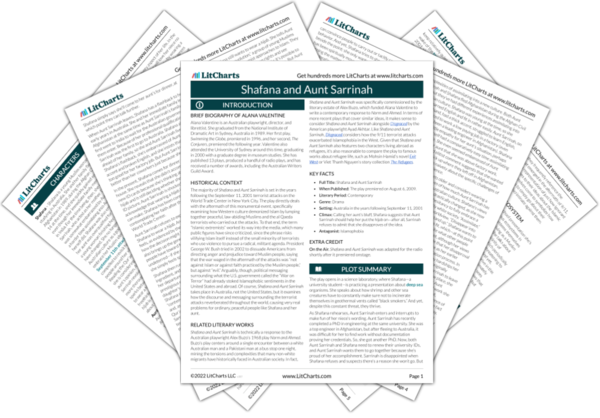Shafana & Aunt Sarrinah acknowledges the prejudices many Muslims face in Western societies. More specifically, the play looks at what it’s like for Muslim women to move through the world with the constant awareness that everyone around them is somehow judging or assessing them. Aunt Sarrinah has dealt with this ever since migrating to Australia, where she has always felt it necessary to keep relatively quiet about her religious beliefs. In fact, in the wake of the terrorist attacks on the World Trade Center in 2001, she quit her engineering job because her coworkers (mostly white Australian men) kept referring to the terrorists as “your lot.” These comments indicate that they had grouped Sarrinah in with the terrorists simply because she’s Muslim—an obviously ignorant and bigoted way of thinking. Stories like this underscore the dispiriting challenges that Muslims face in predominantly white and Christian societies, especially when such societies are quick to categorize and villainize them.
Moreover, though, the play suggests that Aunt Sarrinah has internalized some of the prejudices she herself has faced, as evidenced by the difficulty she has accepting Shafana’s decision to wear a hijab. On an intellectual level, Aunt Sarrinah knows that wearing a hijab is simply an embodiment of a person’s religious devotion, but she still has trouble separating the idea of her niece wearing a hijab with the kind of religious fanaticism that can lead to violence and terrorism—that is, the kind of fanaticism that many Australians have ignorantly assumed she herself condones simply because she’s Muslim. Of course, Sarrinah isn’t actually prejudiced against Muslims who wear hijabs, but in her efforts to protect her niece from bigotry, she ends up strangely perpetuating the unfair assumptions she herself has had to deal with since moving to Australia. In turn, the play emphasizes how unfortunately easy it is to internalize and unwittingly perpetuate unfounded judgments and prejudices. But the play also implies that Aunt Sarrinah is depressingly correct about the bleak reality of the situation: Shafana will undoubtedly encounter more prejudice and bigotry once she starts wearing a hijab.
Judgment and Prejudice ThemeTracker

Judgment and Prejudice Quotes in Shafana and Aunt Sarrinah
SHAFANA: Just. Just wait till you get your qualifications…accepted.
SARRINAH: My engineering degree.
SHAFANA: Yes.
SARRINAH: Why?
SHAFANA: Well, what are you going to tell the teacher? That you work in a factory now? [Pause.] She says, ‘Hello Mrs. Obaidullah and what is it you do?’, and you say, ‘I work packing hardware supplies’?

Unlock explanations and citation info for this and every other Shafana and Aunt Sarrinah quote.
Plus so much more...
Get LitCharts A+SHAFANA: Mum said that she had been contemplating on it for the past five years but had never taken the step to do it. Dad asked me if I was sure of what I was doing. Had I thought about all the consequences, all the things that are going on around the world, all the employment considerations.
SARRINAH: But if you really feel it in your heart these are not reasons not to do it.
SHAFANA: That’s right.
SARRINAH: And is that how you feel?
SHAFANA: I want to make real the change that has happened to me, that God really is there and I believe that.
SHAFANA: But I do not believe it is a holy war.
SARRINAH: Don’t get into that.
SHAFANA: But I don’t. This killing people, this one human being doing such things to another.
SARRINAH: Be careful.
SHAFANA: This is not Islam.
SARRINAH: Don’t open it up.
[…]
SHAFANA: But I read it myself. Specific verses of mercies, insight, compassion, kindness.
SARRINAH: But that is not what your assignment is asking of you. It is asking you to analyse the crisis, analyse the discourse around it, compare and contrast various points of view, summarise, and provide a lucid overview.
SARRINAH: You think you can synthesise Qur’anic values with the twenty-first century?
SHAFANA: Don’t you?
Pause.
SARRINAH: You want to participate in a faith that judges others by the rules it fashions.
SHAFANA: What?
SARRINAH: The rules. The outward cladding of piety.
SHAFANA: No.
SARRINAH: Yes. You want to judge my faith.
SARRINAH: My faith is between me and God. The Qur’an speaks directly to me, Sarrinah, today.
SHAFANA: Of course.
SARRINAH: It is a fundamental part of who I am.
SHAFANA: It is all of who I am.
SARRINAH: No. There is faith and there is reason. There is religion and there is civil society. There is belief and there is the law.
SHAFANA: But your faith touches every part of your life.
SARRINAH: No. My faith is private and cultural. But it is not the answer to all the freedoms we have struggled for.
SHAFANA: But how can you say that?
SARRINIAH: Because I have seen what your brand of religion can do. I have witnessed what your brand of fanaticism can destroy.
SHAFANA: Your solution is just to hide? Fade into the background.
SARRINAH: That’s not what I’m saying.
SHAFANA: Assimilate. Disappear into the masses. Never speak up, never stand up. Well, maybe if you’d spoken up in Afghanistan the country wouldn’t be in the mess it is in now.
In a new country your religion becomes the main focus of how you are being seen, we all go a bit deeper into who we are and where we belong. The society we are living in, we are thinking about how we are going to protect our children, we want it to be in a direction that they are not going to be hurt, not going to be victimised.











